Understanding the Importance of Family Therapy in Elder Care
As the elderly population faces unique challenges related to substance use and mental health disorders, integrating family therapy into their behavioral treatment plans has emerged as a vital approach. Family therapy not only supports the individual in recovery but also transforms familial dynamics to foster long-term healing and abstinence. This article explores how family involvement enhances recovery outcomes for older adults, the varying models of family-based therapy, and the broader landscape of comprehensive behavioral health services designed to meet their needs.
Comprehensive Treatment Services for Substance Abuse and Mental Health Issues in Elders
What comprehensive treatment services are available for substance abuse and mental health issues?
Comprehensive treatment for substance abuse and mental health issues includes a variety of evidence-based interventions designed to address complex needs. These services range from medical detoxification to inpatient and outpatient rehabilitation programs.
Counseling plays a central role, involving individual sessions and family therapy approaches that focus on improving communication, supporting abstinence, and addressing relational triggers. Behavioral therapies such as cognitive-behavioral therapy (CBT) and specialty family therapies like Behavioral Couples Therapy (BCT) and Multidimensional Family Therapy (MDFT) help modify the behaviors associated with substance use.
Medication-assisted treatment (MAT), including drugs like methadone and buprenorphine for opioid use disorder, is integrated into care to reduce cravings and withdrawal symptoms. Education about these medications is crucial for both clients and their families to overcome myths and stigma.
Tailoring treatments for the elderly
Treatments are tailored to meet the specific needs of older adults by considering age-related physical health concerns, cognitive changes, and social dynamics. This involves adapting interventions to mobility constraints, sensory impairments, and co-occurring medical conditions common among elders.
Family involvement is emphasized, recognizing various family structures including chosen families. Therapists conduct thorough assessments of family functioning, strengths, and interaction patterns, ensuring cultural competence to honor the elder’s values and experiences.
Role of counseling and medication-assisted treatment
Counseling addresses both substance use and mental health issues simultaneously, often involving family therapy to foster a supportive environment. Therapists help families develop healthier communication, manage stress, and support recovery together.
Medication-assisted treatment complements counseling by stabilizing clients medically, improving treatment retention and reducing relapse risk. Combining MAT with family education increases the chances of long-term recovery.
Support and prevention services
Support services such as peer recovery groups, crisis helplines, and community outreach programs provide ongoing care beyond formal treatment. These services facilitate social support networks and encourage self-care among family members.
Prevention efforts target risk factors through community education and policy enforcement to promote healthy behaviors. Mobile health clinics and telehealth expand access for elders with mobility or transportation barriers.
Organizations like SAMHSA and OASAS oversee the quality and accessibility of these comprehensive services, ensuring they address the complex needs of elders facing substance abuse and mental health challenges.
Addressing Various Forms of Addiction through Integrated Treatment Programs
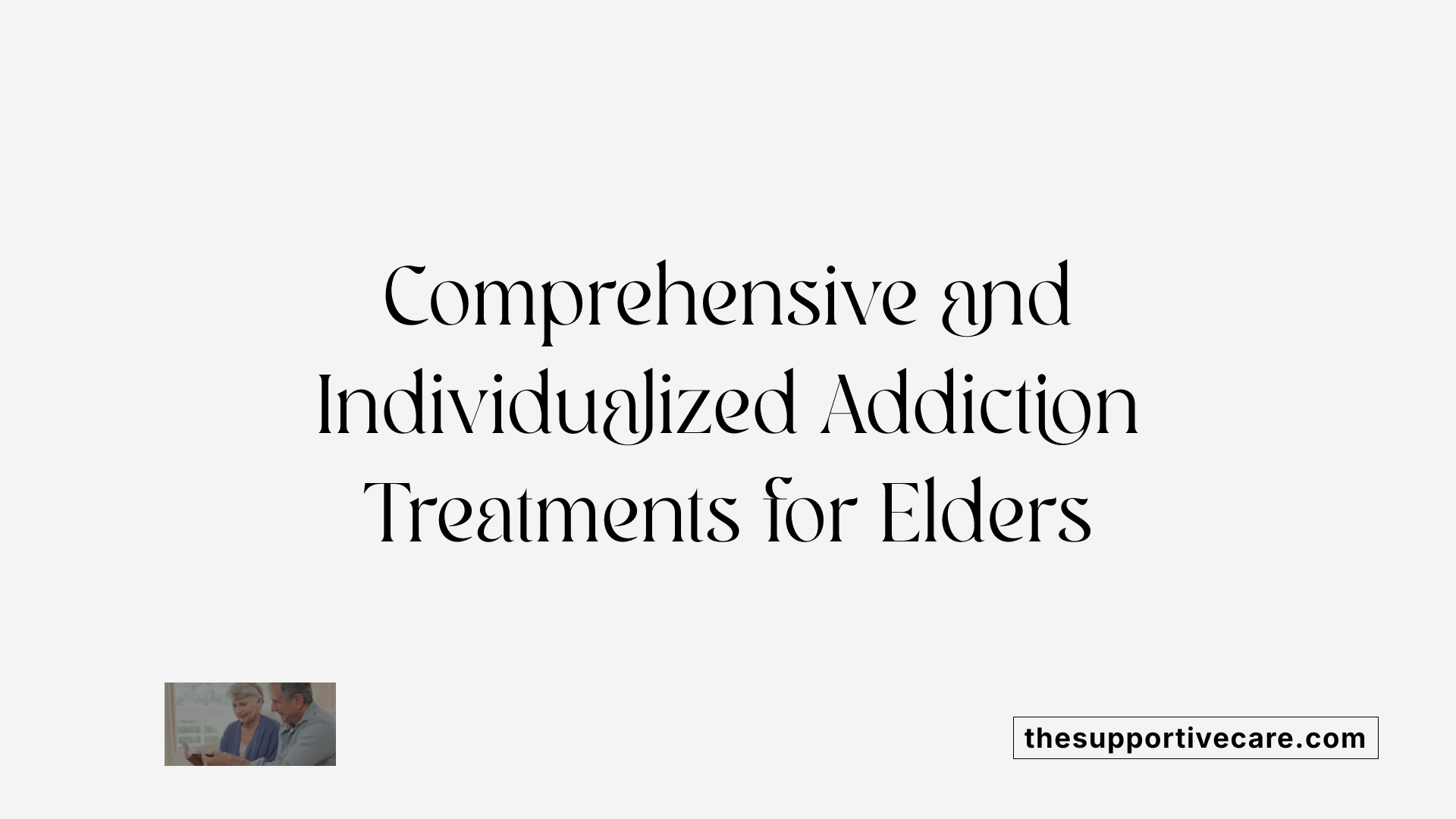
How do treatment programs address various forms of addiction?
Treatment programs take a comprehensive and individualized approach to tackle different types of addiction. They combine medical, psychological, and social interventions tailored to each person's unique needs. This may include evidence-based behavioral therapies such as cognitive-behavioral therapy, motivational enhancement, and contingency management, which help individuals develop coping skills and change unhealthy behaviors.
Medication-assisted treatment (MAT) plays a critical role, particularly for opioid use disorders, using medications like methadone, buprenorphine, and naltrexone to manage withdrawal, reduce cravings, and support abstinence. Providers also educate families about these treatments to dispel myths and increase support.
Family involvement is highly encouraged. Family therapy focuses on improving communication, relationships, and support systems to create a healthier recovery environment. Programs often tailor family therapy to the client’s definition of family and culture, including blended families, friends, or chosen family. Therapy aims to break cycles of enabling and codependency while reinforcing accountability and coping.
Alongside direct treatment, programs integrate prevention efforts and community resources such as mutual aid groups, mobile health clinics, and crisis intervention teams. These outreach services are vital for early identification, ongoing support, and reducing relapse risks.
By addressing the medical, relational, and social factors of addiction, integrated treatment programs foster lasting recovery across ages and addiction types.
The Role of Family Therapy in Enhancing Elder Behavioral Health Outcomes
How Does Family Therapy Positively Impact Treatment Engagement and Retention?
Family therapy plays a significant role in increasing engagement and retention in substance use disorder (SUD) treatment for older adults. Involving family members or significant others creates a stronger support network that encourages clients to remain in treatment programs longer. This involvement enhances motivation, fosters accountability, and reinforces the client's commitment to recovery — factors essential for sustained behavioral health improvement among elders.
How Does Family Support Influence Long-Term Abstinence and Relapse Prevention?
Positive family and social support have been strongly linked with long-term abstinence from substance use in adults, including the elderly. Family therapy targets dynamics within the family that might trigger substance use and works to modify these relational behaviors. By improving family communication and reducing enabling or codependent patterns, family therapy decreases the risk of relapse and helps maintain sobriety over time.
How Does Family Therapy Improve Communication and Support Within Families?
Effective family therapy approaches focus on enhancing communication, clarifying family roles, and resolving relational conflicts that may contribute to substance use problems. This creates an environment where emotions are freely expressed without blame, facilitating healing in recovery. Improved communication paves the way for families to support each other better, develop healthier coping strategies, and adapt more successfully to the recovery process.
How Is Family Involvement Tailored to the Client’s Definition of Family?
Family involvement in therapy is flexible and respects the client’s unique concept of family. This includes not only biological relatives but also blended family members, close friends, or chosen family, which is particularly relevant for elders who may have diverse social supports. Tailoring involvement ensures that therapy aligns with the client's social realities and enhances recovery by harnessing their most meaningful support systems.
Assessment and Safety Considerations in Family Therapy for Older Adults
Comprehensive Family Assessments and Interaction Patterns
Effective family therapy for older adults with substance use disorders begins with thorough family assessments. These evaluations explore interaction patterns, family strengths, challenges, and the history of both substance use and mental health. Intake interviews involve not only the client but also family members, to gather a holistic understanding of the family dynamics influencing recovery.
Screening for Domestic Violence, Abuse, and Cognitive Impairments
Before initiating family therapy, screening for critical circumstances such as domestic violence, abuse, co-occurring mental health issues, and cognitive impairments is essential. This ensures the safety of all participants and helps therapists tailor appropriate interventions for older adults who may be particularly vulnerable.
Addressing Significant Family Issues While Ensuring Safety
Family therapy can still be appropriate when significant family issues exist, provided the family unit is stabilized and safety concerns are sufficiently addressed. Therapists work to create a secure environment where older adults and their families can openly engage in therapy, facilitating healing and reducing relapse risks.
Importance of Cultural Competence in Therapy
Cultural competence is vital in family therapy with older adults. Therapists must consider diverse family structures—including blended and chosen families—and respect cultural values, communication styles, and histories of discrimination or trauma. This sensitive approach improves engagement and effectiveness, promoting healthier family functioning during recovery.
Evidence-Based Family Therapy Models Beneficial for Elder Substance Use Disorders
Behavioral Couples Therapy (BCT)
Behavioral Couples Therapy is an approach originally designed for cohabiting couples dealing with substance use disorders. BCT emphasizes improving relationship dynamics, communication, and support between partners. For elderly clients, BCT can be effective in creating a supportive environment that encourages abstinence and reduces relapse risk by fostering positive partner involvement in treatment.
Risk Reduction through Family Therapy (RRFT)
RRFT is a specialized family therapy model that addresses co-occurring issues such as trauma, PTSD, mental health challenges, and substance use disorders, particularly among trauma-exposed adolescents. While its primary focus is younger populations, RRFT principles have potential relevance for older adults facing intersecting mental health and substance use concerns, by integrating trauma-informed care within family-centered interventions.
Multisystemic Family Therapy (MST) and Functional Family Therapy (FFT)
MST and FFT are evidence-based, comprehensive approaches targeting family systems and broader social networks to address substance use. MST focuses on multiple systems impacting the individual, including family, community, and social circles, while FFT targets improving individual behaviors and family interactions. Both therapies employ strategic interventions to modify patterns that contribute to substance misuse, which can be adapted to elder populations by considering unique family roles, cultural contexts, and communication styles.
Tailored Behavioral, Psychoeducational, and Motivational Techniques
Effective family therapy for elder substance use disorders often integrates behavioral methods, psychoeducation, and motivational strategies tailored to client and family needs. These techniques focus on clarifying family roles, enhancing communication, and modifying behaviors that trigger substance use. Psychoeducation dispels myths about addiction and medication, while motivational interventions encourage positive change and sustained abstinence. This individualized, culturally competent approach strengthens family support networks, essential for elder recovery.
Breaking the Cycle: Family Therapy's Role in Addressing Dysfunctional Dynamics and Enabling Behaviors
Identifying and modifying enabling and codependent behaviors
Family therapy plays a crucial role in breaking the cycle of substance use disorders by recognizing and addressing enabling and codependent behaviors within family systems. These behaviors often perpetuate substance misuse by shielding the individual from the consequences of their actions or fostering unhealthy dependence. Through therapy, family members learn to establish healthy boundaries and support responsible recovery without inadvertently encouraging relapse.
Restoring healthier communication patterns
Effective family therapy focuses on improving communication among all members, creating an environment where emotions can be expressed openly without blame or shame. This fosters understanding and reduces misunderstandings that may have contributed to dysfunctional interactions. Improved communication enhances collaboration and problem-solving, which are essential for sustaining recovery.
Supporting mental health needs of family members
Family therapy also acknowledges that family members themselves may have mental health needs affected by or contributing to substance use issues. Therapy provides a space for them to recognize their own emotional challenges, reducing stress and increasing coping skills. Addressing these needs strengthens the family's overall resilience and ability to provide a supportive recovery environment.
Facilitating healing from trauma and emotional wounds
Many families affected by substance use disorders have histories of trauma, dysfunctional dynamics, or long-standing emotional wounds that can exacerbate or stem from substance misuse. Family therapy aims to uncover and address these underlying issues, promoting healing and breaking intergenerational cycles. By working through trauma together, families can develop healthier relational patterns and better support long-term abstinence.
These therapeutic approaches not only improve family functioning but also act as protective factors against relapse, supporting sustained recovery for both individuals and their families.
Cost-Effectiveness and Accessibility of Family-Based Therapy in SUD Treatment
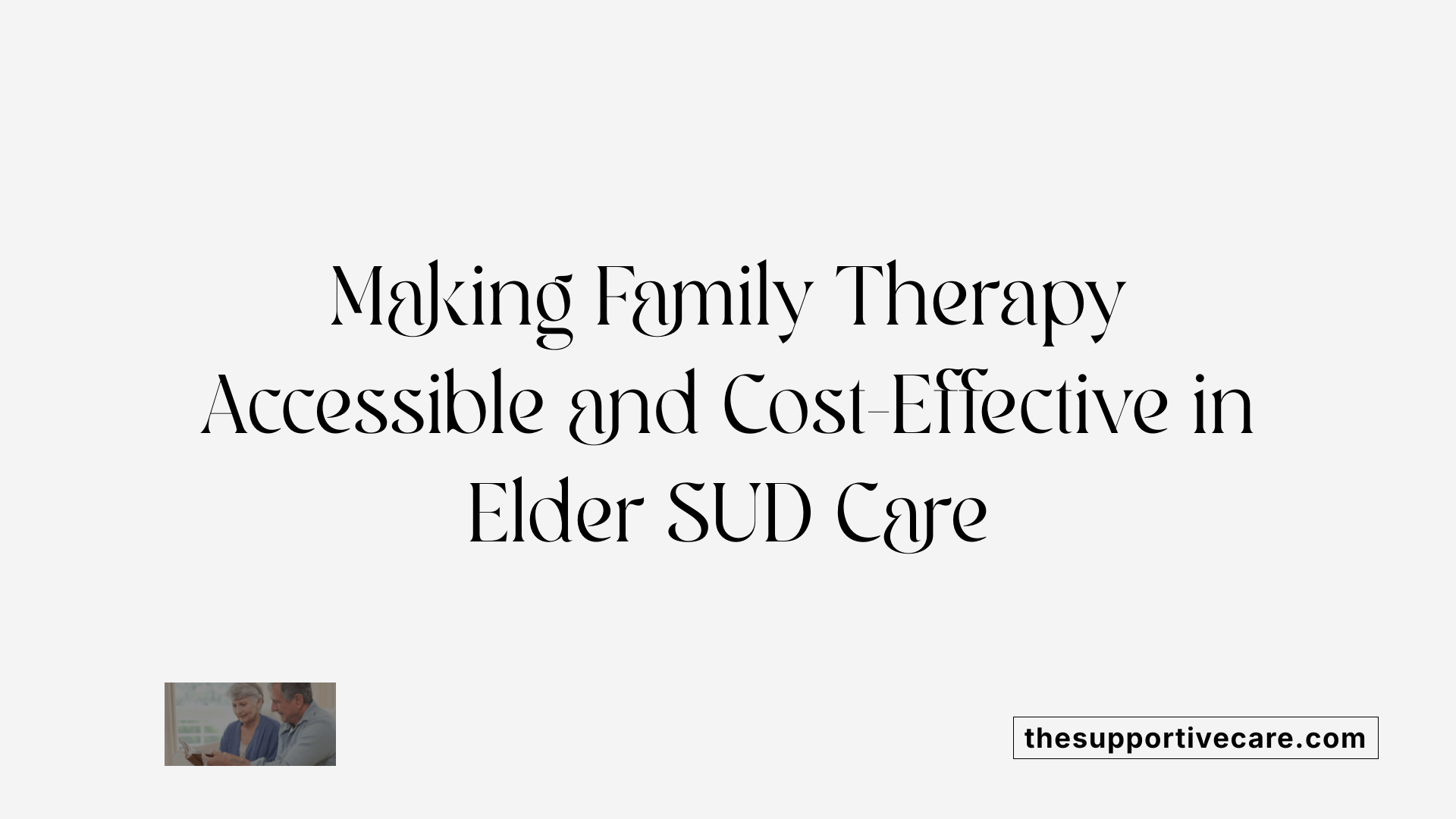
Lower Costs Compared to Non-Family Counseling
Family-based therapy (FBT) has demonstrated economic advantages over traditional non-family counseling models. By addressing relational and systemic factors contributing to substance use disorders (SUDs), FBT can reduce the need for prolonged individual therapy sessions and intensive care. These cost savings stem from more effective engagement and sustained recovery, preventing frequent relapses and costly hospitalizations.
High Prevalence of Family-Based Therapy in Treatment Centers
FBT is widely integrated into SUD treatment approaches, with approximately 74.5% of treatment centers offering some form of family-based intervention. While evidence-based models like Brief Strategic Family Therapy (BSFT) and Multisystemic Therapy (MST) are less commonly implemented (11% and 14%, respectively), the broad availability of family therapy underlines its recognized value in recovery processes.
Use of Virtual and Telehealth Family Therapy
The expansion of virtual and telehealth platforms has enhanced accessibility to family therapy services, especially for family members unable to attend in-person sessions. These flexible options maintain therapeutic continuity and support, accommodating geographic, logistic, or health-related barriers that might otherwise limit participation.
Barriers Related to Insurance, Criminal Justice Involvement, and Employment
Access to family-based therapy varies based on clients' structural factors. Treatment centers report lower family participation rates among clients involved with the criminal justice system or those who are unemployed, pointing to social and resource barriers. Additionally, the extent of family involvement correlates negatively with revenues from Medicaid but positively with private insurance, suggesting insurance type influences accessibility. These disparities highlight the need for targeted efforts to expand equitable access to FBT across diverse populations.
Family Therapy as a Vital Component of Aftercare and Long-Term Recovery Support
Maintaining Healthy Boundaries and Stopping Enabling
Family therapy in aftercare plays a crucial role in helping families maintain healthy boundaries that prevent enabling behaviors. By addressing dysfunctional patterns such as codependency and enabling, therapy guides family members to support recovery responsibly, reducing relapse risk.
Promoting Relapse Prevention and Self-Care
Continuing family therapy fosters relapse prevention by enhancing communication, reducing misunderstandings, and encouraging the development of coping strategies. It also emphasizes the importance of self-care for family members, recognizing their needs to sustain a supportive environment for recovery.
Supporting Family Members Through Mutual Aid Groups
Family-focused aftercare often includes community-based mutual support groups like Al-Anon. These groups provide peer support, stress management resources, and education helping family members cope with the challenges of supporting a loved one in recovery.
Continued Education on Medication-Assisted Treatment and Addiction
Ongoing family engagement includes educating members about evidence-based treatments such as methadone and buprenorphine for opioid use disorder. Dispelling myths and addressing stigma around medication-assisted treatment enhances family support and reduces misconceptions about addiction.
By integrating these components, family therapy serves as a powerful and cost-effective asset in aftercare, reinforcing recovery gains and promoting healthier long-term outcomes for individuals with substance use disorders.
Enhancing Recovery Through Improved Family Education and Stigma Reduction
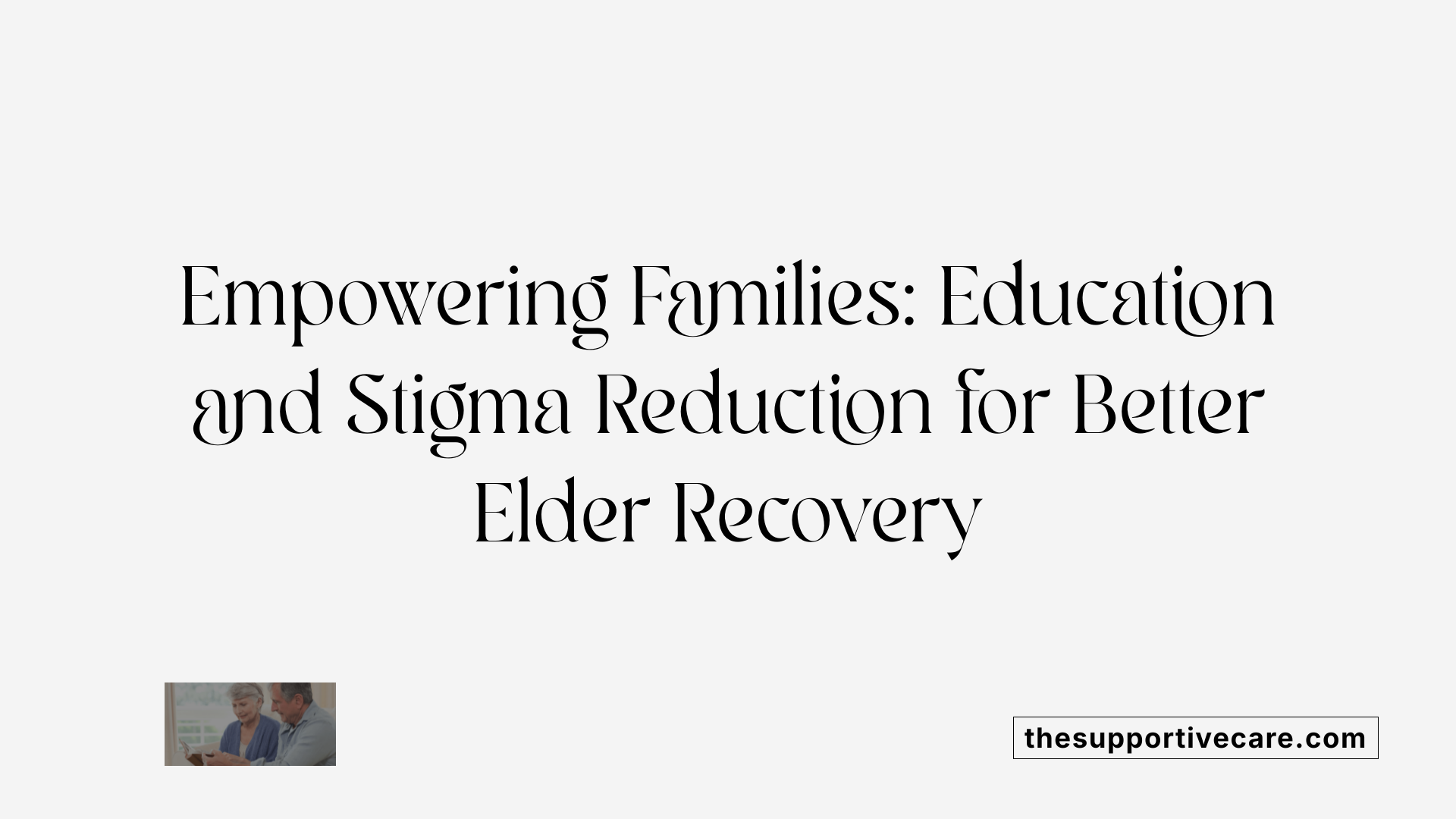
Why is education about addiction and medications important in family therapy?
Educating families about addiction and medication treatments such as methadone and buprenorphine is crucial. These medications are often misunderstood, and myths can create barriers to support. By providing clear, evidence-based information, family members can better understand the challenges of opioid use disorder and the role of medication-assisted treatment, leading to increased empathy and involvement.
How can addressing myths and stigma within families improve recovery?
Family therapy sessions serve as a platform to openly discuss and dispel misconceptions and stigma surrounding substance use disorders. When families confront these issues, stigma lessens, and the secrecy that often surrounds addiction is reduced. This openness encourages honest communication, promotes healthier relationships, and decreases isolation for the person in recovery.
In what ways does increasing family accountability and involvement aid treatment?
Involving family members in treatment not only provides vital emotional support but also fosters accountability. When families understand the recovery process and their role within it, they become active participants—encouraging abstinence, recognizing relapse warning signs, and supporting coping strategies. This shared responsibility strengthens recovery outcomes and reduces relapse risks.
What role does psychoeducation play in promoting recovery?
Psychoeducation is a cornerstone of family therapy for substance use disorders. It equips families with knowledge about addiction's impact on brain function, behavior, and relationships. By understanding these aspects, families develop realistic expectations and learn supportive strategies. This empowerment facilitates adaptive family dynamics, improving communication and long-term recovery success.
Together, these educational and stigma-reduction efforts create a supportive environment that enhances treatment engagement and sustains recovery for individuals facing substance use disorders.
Systemic Approaches and the Broader Behavioral Health Context for Elders
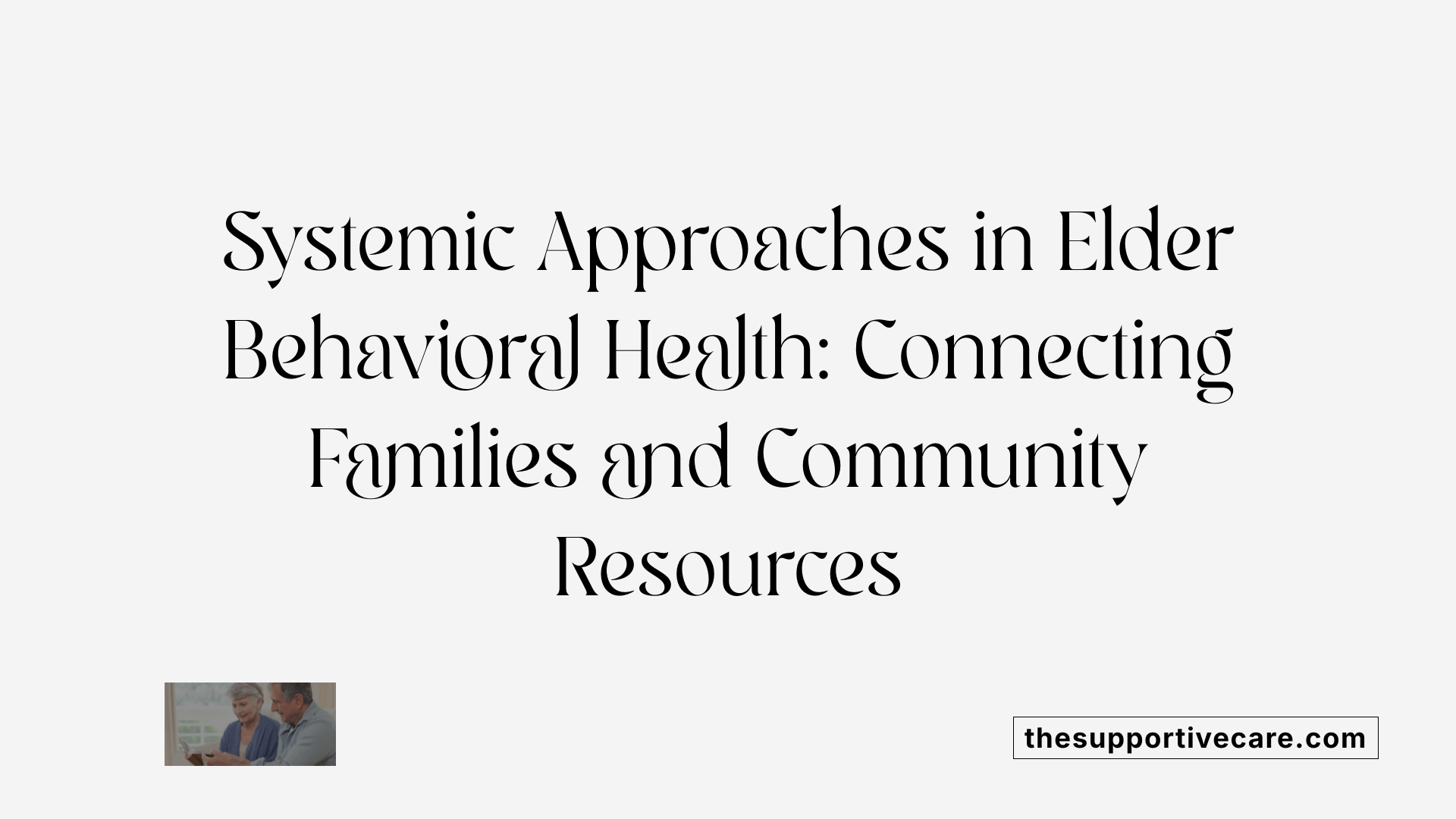
How does systems theory apply in family therapy for elders?
Family therapy for substance use and behavioral health issues is fundamentally grounded in systems theory, which views individuals not in isolation but as part of interconnected systems including family, community, and society. For elders, this means that treatment recognizes the complex relational dynamics and broader social environment influencing health outcomes. Changes in family communication patterns, roles, and responses to behavioral health challenges can lead to systemic healing, benefiting the elder and those around them.
Why is integration of community resources important in elder behavioral health?
Community resources play a vital role in supporting elders and their families. Approaches such as home outreach and community-based programs enhance early identification, prevention, and treatment of behavioral health conditions among older adults. Mobile health clinics and telehealth services improve access, especially in rural or underserved areas, ensuring elder patients receive timely and cost-effective care.
How do social determinants like housing and employment affect elder behavioral health?
Social factors such as stable housing, equitable education, and meaningful employment remain important for elders' behavioral health. Policies promoting social equity and economic stability address these determinants, helping reduce stressors that contribute to substance use and mental health challenges. Supporting elders in obtaining and maintaining essential social supports sustains recovery and improves quality of life.
What workforce developments support effective elder care in behavioral health?
Expanding and diversifying the behavioral health workforce is crucial for providing culturally competent, elder-sensitive care. Structural competency training equips clinicians to understand systemic inequities affecting elders, their families, and communities. Integration of social care with clinical services ensures holistic treatment, addressing both medical and social needs for sustained behavioral health outcomes.
Innovations and Future Directions in Family Therapy for Elder Behavioral Treatment
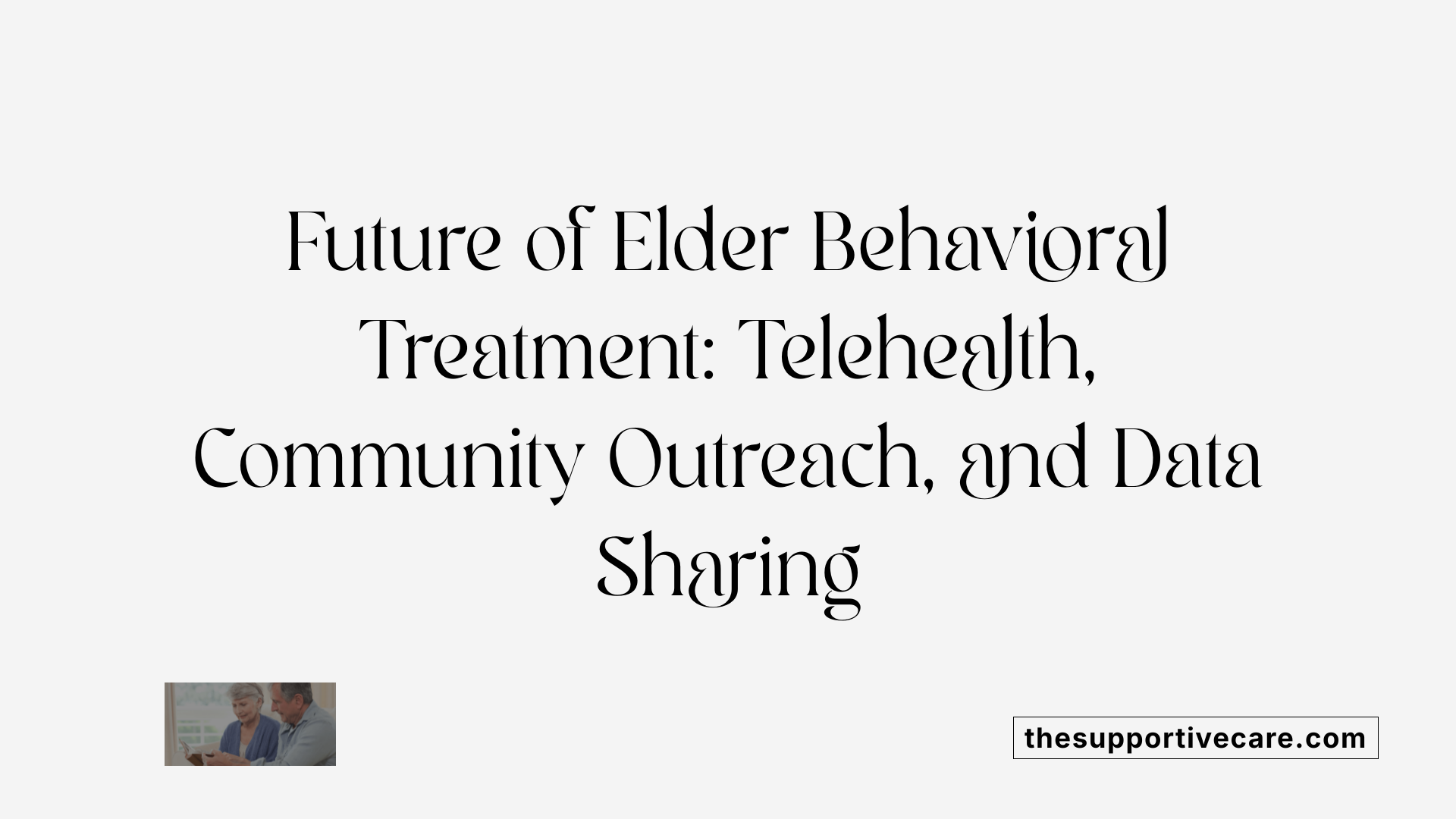
Virtual Therapy Sessions and Mobile Health Clinics
Advancements in technology have enabled the expansion of family therapy into virtual formats, providing flexible and accessible options for clients and their families who may face mobility challenges or geographic barriers. Mobile health clinics complement this by delivering in-person behavioral health services directly to underserved or rural elder populations. These mobile units have shown effectiveness in improving satisfaction and reducing symptoms of depression, making behavioral health care more accessible for the elderly.
Community-Based Outreach and Home Visitation
Early identification and prevention of behavioral health issues among elders benefit from community-based outreach and home visits. These approaches meet elders where they live, offering personalized support and intervention that enhances engagement and retention in treatment programs. Home visitation especially supports elders who may have limited transportation or social contacts, thereby reducing isolation and promoting consistent family involvement in therapy.
Decriminalization and Crisis Response Integration
An important innovation in elder behavioral health care is the shift toward decriminalizing substance use and mental health disorders. Integrating crisis response systems, such as mobile crisis teams and crisis stabilization beds, reduces unnecessary police involvement and incarceration for elders experiencing behavioral health crises. These reforms promote a more compassionate, health-focused approach to crisis intervention tailored to elder needs.
Enhanced Data Sharing and Cross-Sector Funding
Future directions emphasize improved collaboration among health, social, and community service sectors through enhanced data sharing. This facilitates comprehensive care coordination crucial for elders with complex behavioral health challenges. Cross-sector funding models support sustainable, integrated service provision, enabling family therapy programs to evolve with greater resource flexibility and responsiveness to elder-specific social determinants such as housing and employment.
Building Sustainable Recovery: The Long-Term Benefits of Family Therapy for Elderly Individuals
How Does Family Therapy Improve Treatment Completion and Sobriety Duration for Elderly Individuals?
Family therapy significantly enhances treatment completion rates and extends sobriety duration among elderly individuals with substance use disorders (SUDs). Engaging family members or chosen significant others in therapy creates a structured support system that improves retention in treatment programs. Studies show that clients who participate in family-based interventions have a reduced frequency of substance use and fewer substance-related challenges even up to 18 months after treatment. Such sustained engagement is vital for elderly adults who often face unique challenges in recovery, including isolation and co-occurring health issues.
In What Ways Does Family Therapy Help Rebuild Healthier Family Relationships?
Family therapy facilitates the restoration and strengthening of family relationships by improving communication and addressing dysfunctional patterns. Elderly individuals often experience strained relationships due to long histories of substance use and family dynamics. Through interventions focusing on family roles, communication styles, and relational behaviors, therapy helps families to heal emotional wounds and foster a supportive recovery environment. This process not only promotes individual healing but also creates a healthier family system conducive to sustained sobriety.
How Does Family Therapy Reduce Feelings of Isolation and Lower the Risk of Relapse?
Isolation is a common risk factor for relapse in elderly individuals recovering from SUDs. Family involvement creates a sense of belonging and accountability, which acts as a protective barrier against returning to substance use. Therapy addresses enabling behaviors and codependency, encouraging family members to support responsible recovery while attending to their own needs. By breaking the cycle of isolation and fostering open expression of emotions without blame or shame, family therapy reduces stress and helps individuals cope with triggers that might otherwise lead to relapse.
What Role Does Family Therapy Play in Supporting Mental Health Alongside Substance Use Recovery?
Many elderly clients managing SUDs also contend with co-occurring mental health challenges, including trauma and cognitive impairments. Family therapy facilitates comprehensive assessments of these issues alongside substance use. It employs culturally competent approaches that consider family structure, values, and experiences to tailor treatment effectively. The therapy enhances coping skills, reduces family stress, and supports self-care among all members. By integrating mental health support with recovery efforts, family therapy promotes holistic well-being and improves long-term outcomes.
The Transformative Impact of Family Therapy in Elder Behavioral Health
Family therapy stands as a cornerstone in enhancing behavioral treatment outcomes for older adults facing substance use and mental health disorders. By engaging family members as active participants, therapy facilitates lasting recovery, fosters healthier interpersonal dynamics, and reduces relapse rates. Tailored assessments, culturally competent approaches, and a spectrum of evidence-based models ensure therapy meets the diverse needs of elders and their families. Moreover, integrating family therapy within comprehensive and accessible behavioral health services amplifies its effectiveness, supporting sustained abstinence and improved quality of life. As the field advances with innovations such as telehealth and community integration, family therapy will remain pivotal in transforming elder behavioral health treatment plans and nurturing resilient families on the journey to recovery.
References
- THE IMPORTANCE OF FAMILY THERAPY Advisory 39
- Chapter 3—Family Counseling Approaches
- Family Therapy for Addiction Treatment
- 5 Benefits of Family Therapy in Treating Drug Addiction
- Examining Utilization of Family-Based Treatment in ...
- Family Therapy Can Help: For People in Recovery From ...
- Involving family members in substance use disorder ...
- Family Therapy for Substance Use Disorders and Addiction ...
- Transforming Mental Health And Addiction Services



































































































